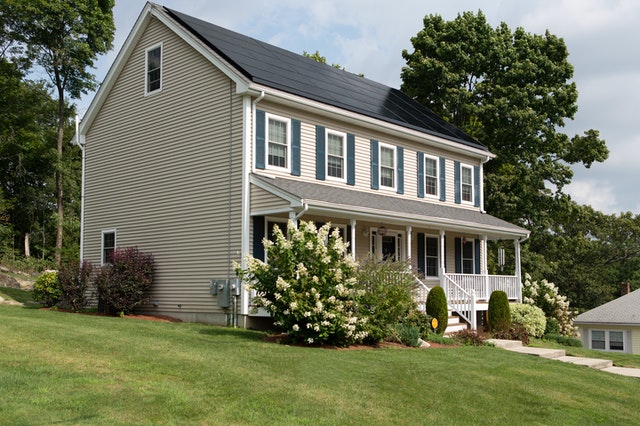Roof Top – Solar Panel Kits
A Solar Roof transforms your existing roof and brings it to life with beautiful solar tiles that can power your home for decades with the energy you produce. An important note is to always check with a roofing contractor in your town to insure they will handle the additional weight.
Main Components of Solar Power Systems
Inverters: Standard home appliances use alternating current (AC) electricity to operate. Inverters take the direct current (DC) electricity produced by solar panels and convert it into AC electricity.
There are two types of inverters: string inverters and microinverters. A string inverter is attached to a wall, and all the solar panels connect to it. A microinverter is attached behind each solar panel. Microinverters offer more energy production, but they cost more than string inverters. Most solar panel kits feature one of these two inverters, as well as essential solar power accessories such as batteries, solar battery chargers, charge controllers and cables.
Most solar panels are constructed from one of three types of solar cells: monocrystalline, polycrystalline or amorphous silicon. Silicon is used for different types of solar panels because it’s a durable material that’s highly efficient and easily accessible.
Monocrystalline solar panels are the most common and efficient type of solar panel available. Due to the silicon’s high purity, these panels excel at producing electricity and boast some of the highest efficiency ratings on the market.
Monocrystalline panels also take up less space, handle high temperatures well and have an impressive lifespan. Some manufacturers offer a 25-year warranty on the panels. These benefits come at a high price point, so consider how much you’re willing to spend if you’re interested in monocrystalline solar panels.
Among the types of solar panels, polycrystalline solar panels are much more efficient. A streamlined manufacturing process ultimately makes these panels less costly than monocrystalline solar panels.
While polycrystalline solar panels are more affordable, they don’t generate as much power as monocrystalline solar panels do. Additionally, polycrystalline solar panels tend to be larger and have a slightly shorter lifespan than their monocrystalline counterparts. They’re also not as effective in high-temperature or low-light situations.
Amorphous solar panels are made from a thin layer of silicon, which allows them to be more flexible and lightweight than monocrystalline and polycrystalline panels. Another benefit is that they perform well in high temperatures. They’re also one of the best solar panels for low-light conditions because they can absorb a wider range of the light spectrum.
Amorphous solar panels, however, are the least efficient since they take up twice as much space to deliver the same amount of power as monocrystalline panels. Their lifespan is also shorter than monocrystalline and polycrystalline panels.
If you’re interested in installing one or more types of solar panels yourself, it’s important to consider a few factors before starting. DIY installation can save you upfront costs and allow you to set up your panels on your own time.
However the whole process is complex, especially if you don’t have firsthand experience. Trying to install solar panels yourself can lead to errors and even electrical shocks, if you’re not careful.
When you install solar panels, you must obtain permits and ensure your installation is up to code, which requires an inspection from a professional. Plus, most DIY solar panel kits are designed for off-grid use, rather than for residential or business use. Once it’s up and running, your DIY solar panel setup may even not generate enough energy to power your home or business.
After deciding on the best solar panels for you, it’s time to figure out how you want to install them. DIY installation may be less costly, but can be quite complicated. With professional installation, you not only get better quality panels, but also the peace of mind that comes with knowing that your solar panel system is properly set up.

